You have chosen "Kariba Stint"
2 Indep Company - Kariba - 3 Platoon - +/- April 1976
When we went operational my platoon was
assigned to this company in Kariba. We had a short pass at the end
of our training at Llewellyn, then went by train to Salisbury. From
there it was by truck to Kariba. On the way, when we reached Makuti,
we changed trucks and ended up with a bunch of Coloured drivers who
drove like raving lunatics. At one point the driver of the truck I
was on lost control going round a bend on a very steep incline and
we almost went over the edge.
I still remember the late afternoon we
arrived. I had never seen Lake Kariba before and was amazed at how
it looked like the sea, stretching off over the horizon to the
south. Below are some images of the area and some of my memories:
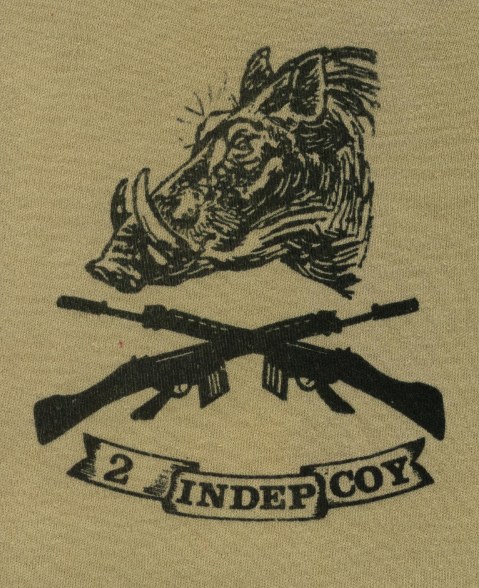
Above Image: 2 Indep Coy, Emblem
I scanned this image from the old 2 Indep T-shirt I still have. Many of us were not happy at 2 Indep. with our CO and his cronies, for reasons you will see in some of my memories described in my pages. The other half of our Company went to the Umtali area and ended up with a far better CO over them.
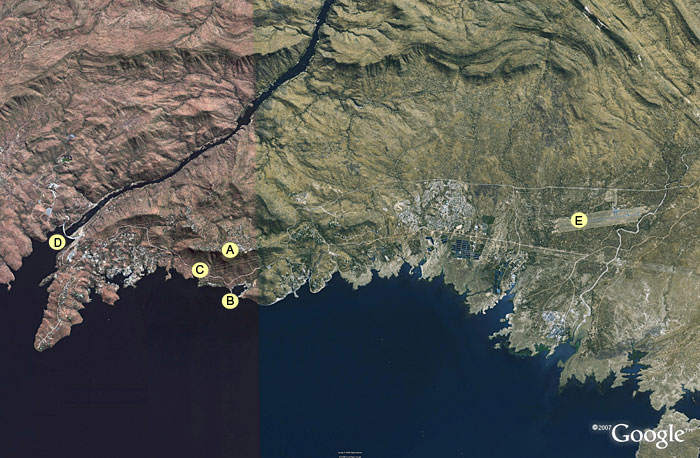
Above Photo: The Area from 50,000ft
A) Army Base:
The small white speck to the right of the "A" is the
basketball court on the edge of the cliff. I looked south from here
over Kariba when we arrived.
B) Carribea Bay:
The casino was here. No persons under 21 were allowed in
but - since were running the risk of dying for our country at 18,
they made a special dispensation to allow soldiers, regardless of
age, to enter if they were in uniform. My first visit to a casino
was here and I took the large sum of $25.00 with me. (That was a lot
of money back then, considering that, as an operational infantryman,
I was being paid the massive sum of $3.50 per day). I lost it of
course. I do remember however, very clearly, playing blackjack at a
table and the dealer being a very attractive, slim, young woman in a
dark purple dress. Background music was playing in the casino at the
time and the song was "Oh What a Night", by Frankie Valley and the
Four Seasons. To this day, every time I hear that song, I think of
that moment, back in time, in the casino.
C) Power lines:
The striations you can see here on the side of the mountain
are the cleared areas under the power lines coming from the power
station at the dam.
D) Kariba Dam Wall:
Once the biggest man-made lakes in the world - built by
Rhodesia - and over the past 20 years, left by the incompetent black
government of Zimbabwe, to deteriorate to such a level that Zimbabwe
does not even have a reliable power supply and suffers from constant
outages that last for days at a time. I visited Zimbabwe in 2012
and, in Bulawayo, there are power outages every day for 6-8 hours at
a time and, every now and then, for days at a time.
E) Airport:
I used to watch our Air Rhodesia Viscount aircraft taking off from here and, if they took off towards the west, they would climb up past our military base. Two of the greatest tragedies and atrocities we suffered during the war occurred a few years after my service, originating from this airfield. Separated by a few months, two civilian Viscounts, carrying holidaymakers and tourists, were shot down after departing from Kariba bound for Salisbury. The communist-backed ZIPRA terrorists used SAM heat-seeking missiles. There were no survivors in one attack and, in the other, 10 survivors, 7 women, 1 man and two children. They were then murdered by the terrorists who arrived at the crash scene about 30 minutes after they shot it down. This attack was , in proportion to our white population, (the group targeted in it) more devastating to us than the 911 Twin Tower attacks in the USA in 2000. And what happened? World leaders in the USA, UK, Europe, Australia, New Zealand, etc. said and did absolutely nothing to condemn it. You see, us white Rhodesians, who built this country out of nothing, had been made out, by the media, to be the worst racists in the world and, to the rest of the world, whatever the terrorists did, was OK because, to them, just like Hitler, the ends justified the means...
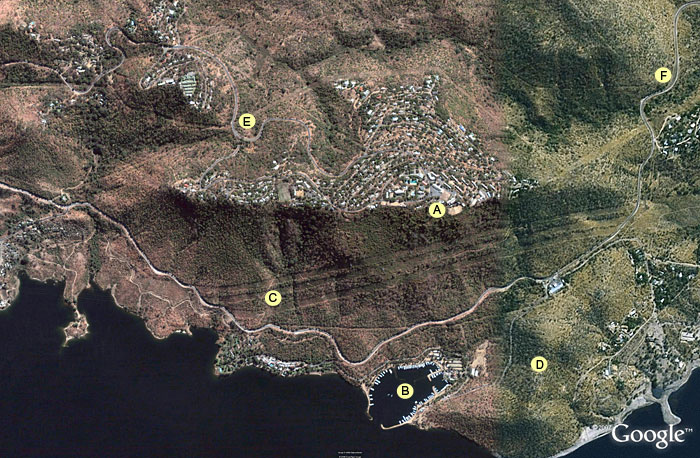
Above Photo: The Area from 12,000ft
A) Army Base:
You can see the basketball court to the right of the "A" on
the edge of the cliff. I still don't know whay there was a
basketball court there as I never saw it being used.
B) Carribea Bay:
This is where one of the casinos were.
C) Power lines:
D) Elephant:
While I was stationed there a waiter was attacked and
killed by an elephant somewhere in this area. He was walking on a
footpath between two resorts when he happened upon the elephant and
that was the end of him.
E) Winding Road:
This is the road that wound down the mountain from the base
to Kariba. I remember that one of our drivers only had one hand and
he drove recklessly thus, I did all I could to avoid ever getting on
a truck he was driving. It would have been bad enough to get killed
by a terrorist, let alone by a reckless, one-handed driver.
On another occasion I went on the "Booze Cruise" on the
hydrofoil. Only one engine was working so they could not go up on
the foils which was disappointing. I did not drink and, as far as
I remember, I was one of very few sober people when we got back to
shore. I remember our driver well, (but will not mention his name)
being so drunk that he could not even climb into the cab. He fell
back, flat onto the parking lot, on his first attempt to get into
the cab. Of course, being the military, he was the only one allowed
to drive the vehicle since he had a military truck driver’s license.
The ride up to the military base that evening with him at the wheel
was the most frightening one I ever had and I was not happy on it.
Thankfully we made it.
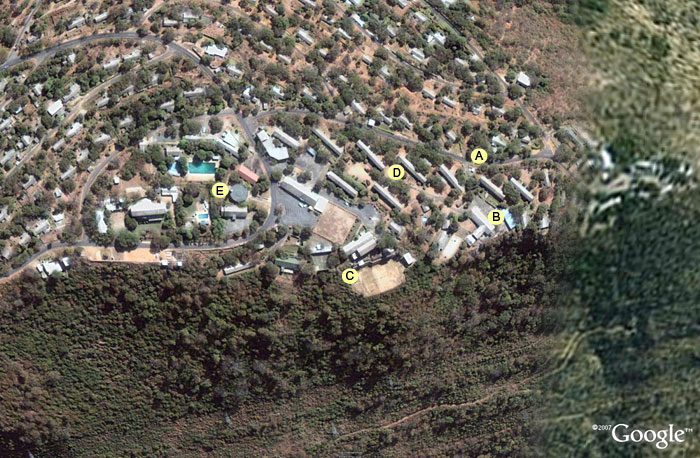
Above Photo: The Area from 5,000ft
A) Base Entrance:
There was a guard hut and boom here.
B) Company Offices:
They were somewhere around here.
C) Basketball Court:
There was a small club house/bar on the north side of the
court and I was on the veranda here once when 3 helicopters landed
on the court. The first landed, and was pushed off the north end.
Another landed and was pushed off to the other end. Then a third
landed in the middle. What made the landings difficult was that
there was a very tall fence on the edge of the cliff - to stop balls
going over - and basketball goals on each end. I watched helicopters
landing here at night and that was amazing. The crew would shine a
spotlight on the basketball goal in front of the pilot and another
on the tip of the rotor blade. The pilot would watch both to make
sure he did not hit the goal and would set the bird down.
Takeoff was a sight to see too. They would lift off, hover
over to the edge of the mountain past the basketball fence, then
dive down over the cliff face and disappear.
D) Barracks:
I was in one of these two barracks on the north side and I
shared a room with Justin Whitcroft.
E) St. Barbara Chapel:
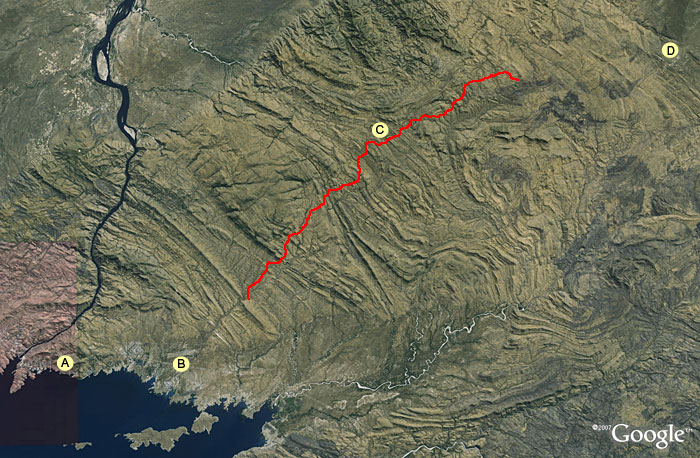
Approximate Route of My First operational Patrol - Easter Weekend - 1976
A) Army Base:
B) Airport:
C) Approximate patrol route:
It was the long Easter Weekend in 1976 and our stick, and
perhaps one or two others I'm not sure) was sent out on the
first operational patrol of our military service to cover the area
north of the main road between Kariba and Makuti to protect
holiday-makers coming to Kariba for the break. I remember that Tom
Whitney was our stick commander but can’t remember who the other two
guys were (probably Malcolm Hatley and Bin Jenkins). Tom was a great
guy and took the job very seriously which I liked. This patrol also
generated my first encounter with wild elephant on foot in the bush.
We saw movement in the thick bush ahead of us and, as we drew closer
we saw animals moving away from us and realised they were elephant.
When we got to the area where they were, all that was left was their
fresh dung. It looked like steaming, fresh, whole-wheat loaves of
bread lying there. I remember looking at the dung and thinking that
an animal had to be pretty big to make dung as big as it was.
In the Rhodesian army we had very lightweight sleeping
bags. On this patrol specifically I remember lying in my sleeping,
bag on the side of a mountain in the dark, with the wind, blowing
like mad, right through it. I was really cold. We had come across a
large dead tree on the side of a mountain that had fallen over and
decided to stay there, under it for the night, thinking that it may
offer some protection from the numerous elephant that roamed the
whole area. Fortunately it was an uneventful patrol. We did not run
into any terrorists and no holidaymakers were attacked.
D) Makuti
It is a small town/village on the road to Salisbury
(Harare).
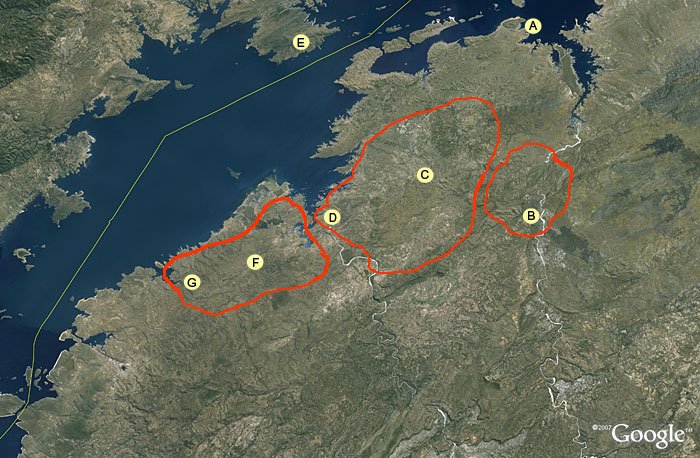
Above: Overview of Our First Company Deployment
A) Bumi Hills:
Shortly after my first patrol over the Easter Weekend noted
above terrorists blew up a private plane on the Bumi Hill airstrip.
We were quickly deployed over to this region and taken across Kariba
by ferry. (See zoomed-in image below)
B) Approximate location of our company base:
For a brief time my platoon was stationed at the company
base that was setup in this area. It was on the side of the gorge
overlooking the Ume River seen near the "B" above and the
Matusadonna Game Reserve. As a platoon we were not happy at all
being stationed at the company base as we quickly came to see that
the full-time CO and officers over us were not going to be up to
much. For example, when we were not out on patrol and were in base,
we were in a dusty camp, living in a tent, in the wild Rhodesian
bush, with only dirt roads and so on. The sergeant major and his
cronies however would have us march down to their area each morning,
have us form us up, then proceed to give us full inspections as if
we were back in training, and yell, scream and swear at us for
having dust on our boots and so on. It's a little difficult to keep
dust off your boots when they march you in the dirt, then inspect
your boots. Typical, bone-headed army garbage that we thought had
finally ended when we finished our training. No such luck however.
They were a bunch of morons and we hated them.
Often, in the afternoons, our PF superiors would want to go
and play volleyball down on the shores and in the shallow waters of
the Ume River. Some of us would be ordered to go with them to to
guard them while they played and cavorted in the river. We would
have to sit up under cover on the banks keeping an eye out for
terrorists, since we were in a war zone, while they shouted and
performed whilst playing volleyball. This really angered us and,
unknown to them, some of us decided that, if they were attacked
while they were playing at the river, we would let the terrs have at
them for a while, hopefully knocking off a few, before we returned
fire to defend them. In my opinion, many of then were classic
military trash and they treated us pretty badly. We, after all, were
the guys doing all the work out in the bush patrolling, looking for
the enemy, and risking our lives for $3.50 a day (for a rifleman)
whilst they sat back in base, being waited on hand-and-foot by their
lackies, then treated us like dirt whenever we were there. I never
understood this mentality I saw so often in the army. If our CO and
his minions had treated us fairly and decently we would have done
anything for them. But , they way they carried on, we would have
been happy to see them shot by terrs, as bad as that sounds... Ian
Smith visited the base while we were there, but most of us were
quickly and conveniently sent out "on patrol" and not allowed to be
there for his visit.
C) Platoon Base:
Thankfully our platoon was ordered to setup a platoon base
in the middle of nowhere, somewhere near the "C" and we left the
company base. We drove as far as we could go by road then had to
carry all of our gear and walked for miles through the bush,
following Jackson, to find a spot for the base. It was at this base
where the event I recounted under Jem
Sheppard of Jem
having to make him a cup of tea occurred.
We patrolled all over this whole area and encountered
elephant, buffalo, rhino, lion, hyena, antelope, zebra, warthog,
hippo, and so on. About the only wild animal I did not see was a
leopard. It was from this base that I got my one and only military
helicopter ride. One of our guys was selected for Selous Scout
training and they sent a chopper to get him. He was out on patrol at
the time and I was in camp. I was taken out by chopper to replace
him in his stick when they picked him up. It was great skimming
across the bush, barely higher than the trees. Most of the time at
this camp Jem Sheppard and I shared a sleeping spot together and we
became good friends. There was a small stream in dense undergrowth
nearby and we used it for water, and downstream for washing.
While we were in this region we heard reports of landmines
being detonated by vehicles but were never close enough to hear one
and, thankfully, did not hit one ourselves. This whole region was a
very wild part of the country and we went out in "sticks" of 4 guys,
three rifles and 1 gun, a Bren or MAG. I was a rifleman and carried
2 grenades, a panga, an FN, 5 mags with 18 rounds in each with a
tracer +/- each 4th bullet. (The mags could take 20 rounds but we
only put 18 to try to keep the bottom two out of dirt that would
fall to the bottom and was impossible to keep out of the magazines.
The FN is a great powerful rifle but, IMO pretty pathetic in a bush
war like we had. It was far too precision made and would jam with
the slightest little bit of dirt in it). Much of my patrolling in
this area was with Tom
Whitney, (stick commander), Bin
Jenkins & Malcolm
Hatley. We all became good friends and, even as of today
(April 2008), I still have contact with Tom and Malcolm. (And, as of
2013, still contact with Tom).
D) Sengwa River:
Somewhere in this area on patrol we crossed a crocodile
infested river in a dugout canoe. A black man ferried us across two
at a time and it was an unnerving experience. With all of our kit,
packs, rifles, ammo, etc. the canoe was very deep in the water and
incredibly unstable. The man told us that a few weeks earlier a
crocodile had killed a school teacher and he made a comment that
this indicated to him that the school teacher could not have been
very intelligent to be taken by a crocodile...
Tom Whitney spoke
one or more, (I can't remember now how many) black languages
extremely well. On one of our patrols we came across a black man,
who was blind, with a small boy who was leading him. Tom spoke to
him in the local language and, after a while, the boy told the man
that we were white. He was surprised as Tom spoke the language so
well he thought we were black.
E) Kota Kota:
As far as I remember that was what we called this
projection from Zambia that we could see across the lake. The
military told us it was a terr haven and that they crossed into our
country from it - but we were not allowed to go and attack it. I
could never understand that. The enemy was there but we were not
allowed to do anything and had to wait for them to come to us and
then try to catch them before they fled back to safety. The people
in charge of our country could not seem to figure out you can't win
a war that way and had rocks in their heads as far as I was
concerned.
F) Second Platoon Base Camp:
Our platoon was relocated again and we setup a base
somewhere in this area. I slept with three other guys here with our
sleeping spot backing up to an anthill. One late afternoon, when I
was in camp, we were sitting talking at our sleeping area when a
long snake, about 6 - 10 ft came zooming right past us headed for
the anthill. One of the guys grabbed his panga and managed to chop
off about the last third of the snake as it went down one of the
holes in the anthill. We watched the anthill for a while, all now
armed with our pangas and the snake suddenly came zooming out again.
This time however it didn't make it and became up chopped up snake.
Also one night at this camp I was sitting, bare footed, at
our fire and got up to walk back to my sleeping area. I walked into
a massive column of marching matabele ants, the smaller dull kind
that look like big wasps, not the big shiny kind, and I felt like
I had stepped on a live electric wire sending lightening bolts
through my feet as they stung me. It was rather painful.
And, a song I remember hearing over the civy radio that was
popular at this time, Smokey - Don't Play Your Rock 'n Roll to Me.
We adapted it to "Don't Point You LMG at Me" and I think of that
every time I hear or think of this song.
G) Mwenda River Mouth:
See more below
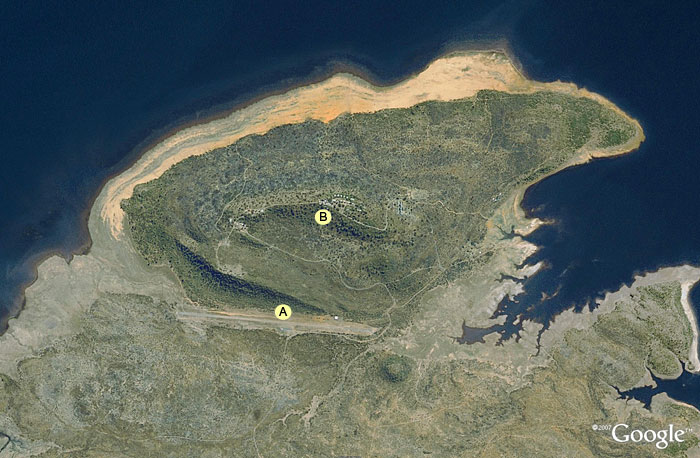
The Bumi Hills Area
A) Bumi Hills Air Strip:
This is where the plane was blown up.
B) Hilltop Settlement:
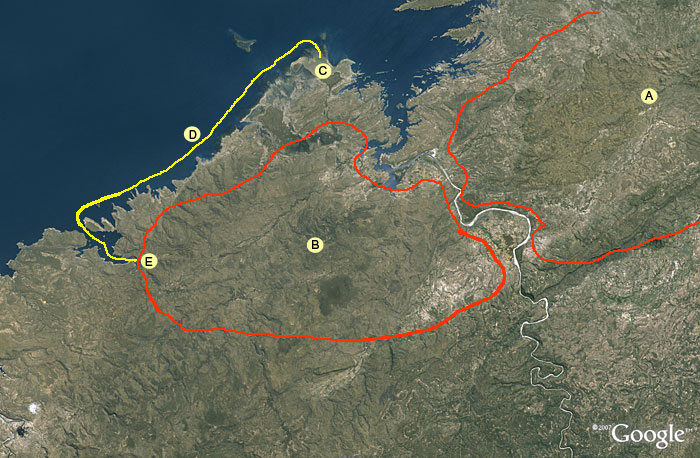
The Sengwa and Mwenda River from 30 miles High
A) Platoon Base:
This is the base I wrote about above.
B) Platoon Base:
This was our second platoon base noted above.
We had terrible military radios at the time. They were
large bulky boxes and the antenna was a thin, stiff rod that stuck
out the top about 24 inches and was easily broken. Often they were
useless and we could not contact our platoon base to report in. We
had two code systems we used to report our positions. One was called
"Shackle" and I don't remember the name of the other. Once, when on
patrol our radio stopped working again and we tried to take it
apart. We found a wire from the battery had come loose, the soldered
connection had broken, so I took my panga, heated it on my gas
cooker and used it as a soldering iron to reconnect the wire to the
battery. Rather an unusual use for a panga I thought. It was also on
one of these areas, "A" or "B" above, I picked up a marula pip from
the inside of elephant dung. I still have that pip and it will be in
some photographs when I add them.
C) D) & E):
Our stick, Tom, Bin, Malcome and I was taken by speedboat
from a fishing village at +/- "C" down the coast "D" up into the
Mwenda River mouth "E" to patrol in this area. (We patrolled all
over the areas outlined in red).
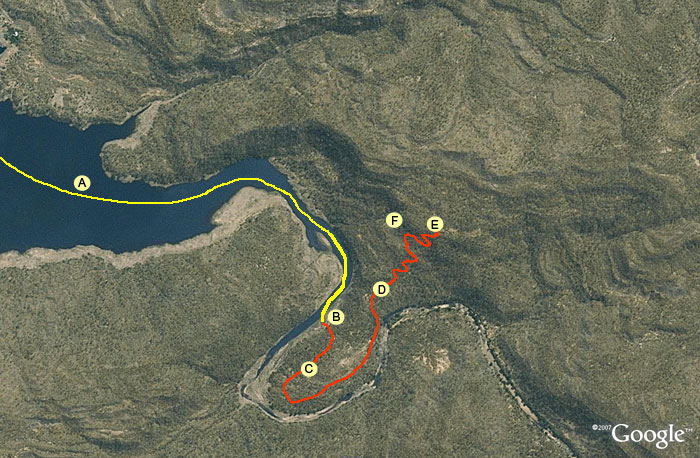
Mwenda River Patrol from 10,000 ft
A) Speedboat Route:
This is where we were brought in by speedboat.
B) Drop-Off Point:
We were dropped off about here and, across the river, saw
massive crocodiles sunning themselves on the bank.
C) Elephant:
This is approximately where I had my first reasonably lose
encounter of the elephant kind. I need to figure out how to make
popups or how to open a new page with a link to recounts these
events.
D) Extremely Close Elephant Encounter:
This was the closest I ever came to a wild elephant, +/- 15
ft. Not something one want to do very often.
E) Rhino:
We climbed this mountain to get away from the elephant -
only to be charged by a rhino up here... Again, I will write out
this story sometime and link it to here.
F) Elephant Cliff Walk:
Please Note:
Everything expressed on this site is my opinion and, the photos, images and drawings, except where noted, are my work and may not be used anywhere, by anyone, without my written permission.
